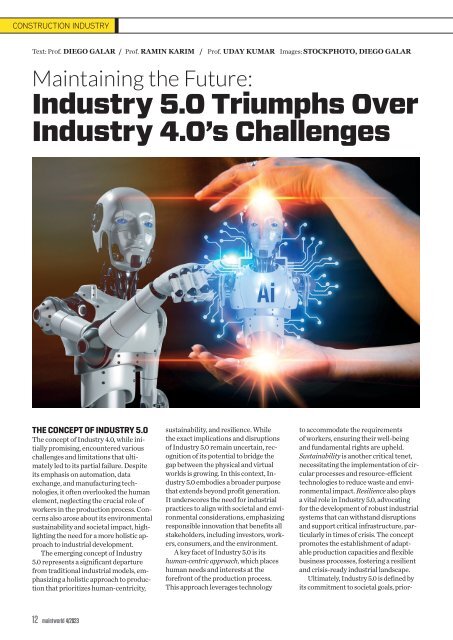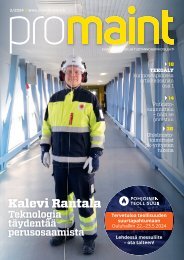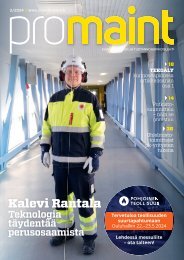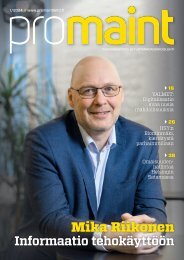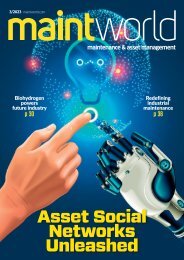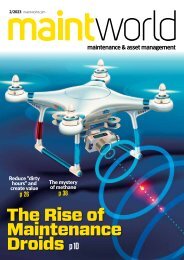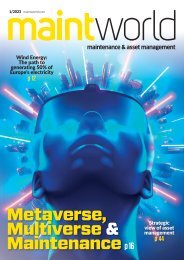Maintworld Magazine 4/2023
- maintenance & asset management
- maintenance & asset management
You also want an ePaper? Increase the reach of your titles
YUMPU automatically turns print PDFs into web optimized ePapers that Google loves.
CONSTRUCTION INDUSTRY<br />
Text: Prof. DIEGO GALAR / Prof. RAMIN KARIM / Prof. UDAY KUMAR Images: STOCKPHOTO, DIEGO GALAR<br />
Maintaining the Future:<br />
Industry 5.0 Triumphs Over<br />
Industry 4.0’s Challenges<br />
THE CONCEPT OF INDUSTRY 5.0<br />
The concept of Industry 4.0, while initially<br />
promising, encountered various<br />
challenges and limitations that ultimately<br />
led to its partial failure. Despite<br />
its emphasis on automation, data<br />
exchange, and manufacturing technologies,<br />
it often overlooked the human<br />
element, neglecting the crucial role of<br />
workers in the production process. Concerns<br />
also arose about its environmental<br />
sustainability and societal impact, highlighting<br />
the need for a more holistic approach<br />
to industrial development.<br />
The emerging concept of Industry<br />
5.0 represents a significant departure<br />
from traditional industrial models, emphasizing<br />
a holistic approach to production<br />
that prioritizes human-centricity,<br />
sustainability, and resilience. While<br />
the exact implications and disruptions<br />
of Industry 5.0 remain uncertain, recognition<br />
of its potential to bridge the<br />
gap between the physical and virtual<br />
worlds is growing. In this context, Industry<br />
5.0 embodies a broader purpose<br />
that extends beyond profit generation.<br />
It underscores the need for industrial<br />
practices to align with societal and environmental<br />
considerations, emphasizing<br />
responsible innovation that benefits all<br />
stakeholders, including investors, workers,<br />
consumers, and the environment.<br />
A key facet of Industry 5.0 is its<br />
human-centric approach, which places<br />
human needs and interests at the<br />
forefront of the production process.<br />
This approach leverages technology<br />
to accommodate the requirements<br />
of workers, ensuring their well-being<br />
and fundamental rights are upheld.<br />
Sustainability is another critical tenet,<br />
necessitating the implementation of circular<br />
processes and resource-efficient<br />
technologies to reduce waste and environmental<br />
impact. Resilience also plays<br />
a vital role in Industry 5.0, advocating<br />
for the development of robust industrial<br />
systems that can withstand disruptions<br />
and support critical infrastructure, particularly<br />
in times of crisis. The concept<br />
promotes the establishment of adaptable<br />
production capacities and flexible<br />
business processes, fostering a resilient<br />
and crisis-ready industrial landscape.<br />
Ultimately, Industry 5.0 is defined by<br />
its commitment to societal goals, prior-<br />
12 maintworld 4/<strong>2023</strong>


